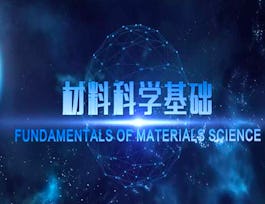We explore “10 things” that range from the menu of materials available to engineers in their profession to the many mechanical and electrical properties of materials important to their use in various engineering fields. We also discuss the principles behind the manufacturing of those materials.


Materials Science: 10 Things Every Engineer Should Know
Taught in English
Some content may not be translated
99,432 already enrolled
(4,346 reviews)
Skills you'll gain
Details to know

Add to your LinkedIn profile
11 quizzes
See how employees at top companies are mastering in-demand skills


Earn a career certificate
Add this credential to your LinkedIn profile, resume, or CV
Share it on social media and in your performance review

There are 5 modules in this course
Welcome to week 1! In lesson one, you will learn to recognize the six categories of engineering materials through examples from everyday life, and we’ll discuss how the structure of those materials leads to their properties. Lesson two explores how point defects explain solid state diffusion. We will illustrate crystallography – the atomic-scale arrangement of atoms that we can see with the electron microscope. We will also describe the Arrhenius Relationship, and apply it to the number of vacancies in a crystal. We’ll finish by discussing how point defects facilitate solid state diffusion, and applying the Arrhenius Relationship to solid state diffusion.
What's included
10 videos2 quizzes
Welcome to week 2! In lesson three we will discover how dislocations at the atomic-level structure of materials explain plastic (permanent) deformation. You will learn to define a linear defect and see how materials deform through dislocation motion. Lesson four compares stress versus strain, and introduces the “Big Four” mechanical properties of elasticity, yield strength, tensile strength, and ductility. You’ll assess what happens beyond the tensile strength of an object. And you’ll learn about a fifth important property – toughness.
What's included
10 videos2 quizzes
Welcome to week 3! In lesson five we’ll explore creep deformation and learn to analyze a creep curve. We’ll apply the Arrhenius Relationship to creep deformation and identify the mechanisms of creep deformation. In lesson six we find that the phenomenon of ductile-to-brittle transition is related to a particular crystal structure (the body-centered cubic). We’ll also learn to plot the ductile-to-brittle transition for further analysis.
What's included
8 videos2 quizzes
Welcome to week 4! In lesson seven we will examine the concept of critical flaws. We’ll define fracture toughness and critical flaw size with the design plot. We’ll also distinguish how we break things in good and bad ways. Lesson eight explores the concept of fatigue in engineering materials. We’ll define fatigue and examine the fatigue curve and fatigue strength. We’ll also identify mechanisms of fatigue.
What's included
10 videos2 quizzes
Welcome to week 5! In lesson nine we’ll deal with how to make things fast and slow. We’ll examine the lead-tin phase diagram and look at its practical applications as an example of making something slowly. Then we’ll evaluate the TTT diagram for eutectoid steel, and compare diffusional to diffusionless transformations with the TTT diagram, monitoring how we make things rapidly. Lesson ten is a brief history of semiconductors. Here, we discuss the role of semiconductor materials in the modern electronics industry. Our friend Arrhenius is back again, and this time we’re applying the Arrhenius Relationship to both intrinsic and extrinsic semiconductors. We’ll also look at combined intrinsic and extrinsic behavior.
What's included
12 videos3 quizzes
Instructor

Offered by
Recommended if you're interested in Mechanical Engineering

Georgia Institute of Technology

Shanghai Jiao Tong University

École des Ponts ParisTech

Arizona State University
Why people choose Coursera for their career




Learner reviews
Showing 3 of 4346
4,346 reviews
- 5 stars
75.96%
- 4 stars
20.28%
- 3 stars
2.99%
- 2 stars
0.50%
- 1 star
0.25%

Open new doors with Coursera Plus
Unlimited access to 7,000+ world-class courses, hands-on projects, and job-ready certificate programs - all included in your subscription
Advance your career with an online degree
Earn a degree from world-class universities - 100% online
Join over 3,400 global companies that choose Coursera for Business
Upskill your employees to excel in the digital economy
Frequently asked questions
Access to lectures and assignments depends on your type of enrollment. If you take a course in audit mode, you will be able to see most course materials for free. To access graded assignments and to earn a Certificate, you will need to purchase the Certificate experience, during or after your audit. If you don't see the audit option:
The course may not offer an audit option. You can try a Free Trial instead, or apply for Financial Aid.
The course may offer 'Full Course, No Certificate' instead. This option lets you see all course materials, submit required assessments, and get a final grade. This also means that you will not be able to purchase a Certificate experience.
When you purchase a Certificate you get access to all course materials, including graded assignments. Upon completing the course, your electronic Certificate will be added to your Accomplishments page - from there, you can print your Certificate or add it to your LinkedIn profile. If you only want to read and view the course content, you can audit the course for free.
You will be eligible for a full refund until two weeks after your payment date, or (for courses that have just launched) until two weeks after the first session of the course begins, whichever is later. You cannot receive a refund once you’ve earned a Course Certificate, even if you complete the course within the two-week refund period. See our full refund policy.


